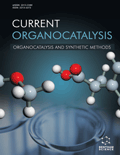To find the most relevant journal, please insert appropriate keyword to facilitate search.
Search Results: COCAT

Current Organocatalysis
ISSN: 2213-3372 (Print)
eISSN: 2213-3380 (Online)

ISSN: 2213-3372 (Print)
eISSN: 2213-3380 (Online)